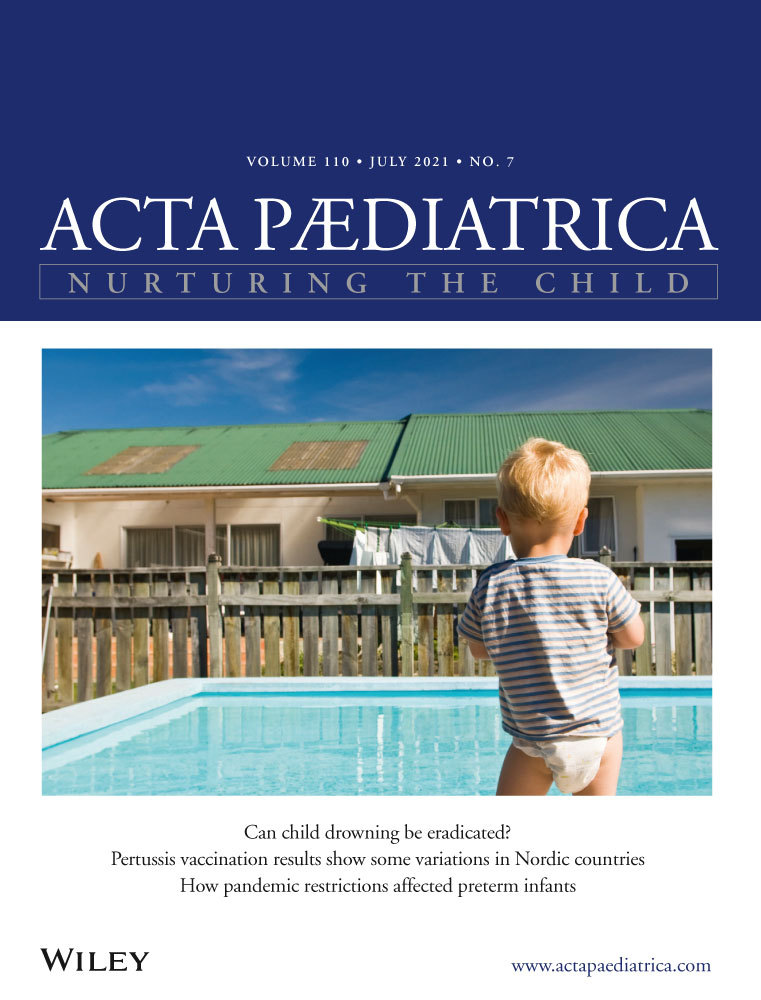Survey results raise important issues about the ethical aspects of intensive care treatment for extremely preterm infants
Funding information
None.
Abbreviation
-
- EPT
-
- extremely preterm
The development of science and technology over the last 60 years has decreased the mortality of infants born preterm and extremely preterm (EPT). Some may claim that it has been a large-scale, ongoing experiment without ethical research approval or informed parental consent. But if EPT born babies always survived and the intensive care they received would have no physical, mental or cognitive side effects or complications, the development would be a wonderful scientific story. However, there are plenty of short-term and long-term issues that should be considered before initiating intensive care treatment of EPT infants or withholding it.
Fauchère et al discuss the issues raised by their questionnaire-based survey of Swiss neonatal physicians and nurses in this issue of Acta Paediatrica.1 These include who is most qualified to make decisions about EPT infants, with regard to initiating, withholding or withdrawing life-sustaining treatment.1 I would like to look at some general aspects of prematurity before discussing this specific study.
Human beings are all technically born preterm for evolutionary reasons.2 We have a larger brain and scalp than other primates, such as gorilla neonates, and our brains are not fully developed so that we can pass the birth canal.2 This precondition for regular vaginal deliveries also has consequences for babies during the first three months of life. This kind of prematurity has been associated with apparent life-threatening events (ALTE) now called brief resolved unexplained events (BRUE).3 Babies born at less than 32 weeks of gestation have high risk of BRUE 3 and were previously described as near-miss sudden infant death syndrome.4
Against this backdrop, it is understandable that physicians see intensive care as a precondition for the survival of EPT infants, with a gestational age of less than 28 weeks. But just because EPT infants can survive, it is not necessarily a physician's duty to ensure that they do. Initiating and withholding intensive care for EPT infants is not something that should only be discussed by physicians, other parties, such as parents, habilitation physicians, other paediatricians and representatives of society should also be involved. The Fauchère et al paper makes an important contribution to these discussions.1
One issue covered by Fauchère et al was long-term quality of life, such as whether extreme preterm infants can complete primary school and whether they will be able to take care of themselves in the future. Unlike most neonatal physicians and nurses, the majority of the general public see these as central issues when discussing whether to provide EPT infants with intensive care.1 This is because EPT babies can need life-time support from their parents or society. Parents also need to consider how their cognitively affected offspring may affect family life and their other children.
Some neonatal healthcare providers feel that they are the best people to protect and make surrogate decisions on behalf of EPT infants.1 Fauchère et al's paper describes the attitudes of neonatal physicians as paternalism. But is it pure paternalism and do they solely have the EPT infants' best interest in mind? Could physicians have conflicting interests, such as research interests?5 It is important to point out that since 2013 parents in Switzerland have had the authority to make surrogate decision when their children are unable to decide for themselves.1 This means that Swiss physicians are expected to promote shared decision-making.
Fauchère et al also suggest that adopting a paternalistic attitude could mean that neonatologists do not tell parents everything about their infant's condition, as they do not want to worry them; however, they could also do this to exclude parents from participating in decision-making. If so, it might be considered as merely pretended paternalism.
But what would physicians tell parents? Would they tell them about the risks of different types of impairment?6 Would they talk about the risk of autism due to long-lasting incubator treatment?7 And how would they present such information? Would they exaggerate the expected good prognosis or tone-down the risks of a more pessimistic prognosis?8
Fauchère et al point out that the physicians who took part in their study would have had their own personal values. They also state that cultural-based values might influence their attitudes and point to the different results in the German- and French-speaking areas they surveyed. Those differences may have affected whether or not intensive care was initiated, withhold or withdrawn. Similar differences have also been reported by Swedish studies.5, 8-10
Finally, Fauchère et al also discussed whether or not to treat EPT infants equally to other infants and older children. Significant more physicians (82%) than nurses (57%) stated that the same ethical principles should apply. However, the responses to this question might be difficult to understand, because we do not know how the respondents understood the question.
If we accept the principle that equal cases should be treated equally, and that need should determine how we act, it is easy to agree that EPT babies should be treated the same manner as other children. Age, in itself, is not relevant in priority settings. But, we need to consider how different patients of the same age, with the same disease, would tolerate a certain treatment. Patient A could have a significantly better outcome than patient B, who is very frail, has several comorbidities and would probably not survive a potential surgical intervention. If the outcome of the treatment would make no difference to patient B, we might consider the treatment as futile. But if we estimate that the surgical intervention could harm them more than it benefitted them, we should not perform the procedure. Even if we agree in principle that equal cases should be treated equally, equal cases are not always really equal, due to relevant medical differences. These mean that sometimes equal treatment cannot be provided.
If we apply this reasoning to the intensive care treatment of frail EPT infants, and compare that with the treatment that older infants or children receive, we might see relevant differences between some of them. If the prognosis is very pessimistic with regard to both the survival and quality of life of EPT infants, physicians may be motivated to withdraw life-sustaining treatment.
Fauchère et al's study showed that nurses were less inclined than physicians to apply treatments that were too aggressive, possibly because they felt it was not in the best interests of the patients. This might also explain why nurses and physicians responded differently to the equality question.
Fauchère et al state that parents should be involved in decision-making, even though physicians and nurse may already have differing views. Their interests focus on the whole family and go beyond the intensive care that their EPT baby receives. Physicians may be unused to a family-centred approach in this context. However, listening to the family's worries, ideas, hopes and preferences, before informing the family about what their baby may face in the future, is an important step in the shared decision-making process.
We all have lessons to learn about family-centred care as a precondition for providing adequate information and genuine shared decision-making. Physicians and nurses working in intensive care settings should follow family-centred models when they inform parents and families about the possible outcomes for their EPT infant. They should also make shared decisions without letting disguised paternalistic or private values affect how they present the facts.8
The paper by Fauchere et al1 provides a good basis for future discussions on providing intensive care for EPT infants.
CONFLICT OF INTEREST
None.





